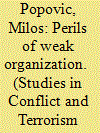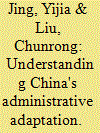| Srl | Item |
| 1 |
ID:
141294


|
|
|
|
|
| Summary/Abstract |
Why do some militant groups defect against their sponsors, while others remain loyal? Pakistan's sponsorship of Jaish-e-Mohammad and Lashkar-e-Taiba offers a controlled case comparison as the former turned its guns against Islamabad, while the latter remained obedient despite a similar strength, ethnic ties to the regime, and the presence of alternative supporters. What explains Jaish's defection and Lashkar's loyalty? Drawing on organizational and principal-agent theory, I argue that militant organizations that are more decentralized and factionalized are more likely to turn on their sponsors, because their weak command and control as well as dispersed decision making limit the militant leaders' ability to follow through on their commitments to the sponsors and makes it more difficult for the sponsors to discipline the militant organization. When a sponsor attempts to coerce such organizations into submission by detaining militant leaders, freezing or confiscating their material assets the rank-and-file is likely to turn guns against the sponsor.
|
|
|
|
|
|
|
|
|
|
|
|
|
|
|
|
| 2 |
ID:
101199


|
|
|
|
|
| Publication |
2010.
|
| Summary/Abstract |
This paper provides an alternative perspective on the post-1978 incremental adaptation of the Chinese administrative state. Unlike other studies that focus on the centralized reforms of the rationalized state or fragmentation and competition within the state, this paper analyzes the neglected strategies of self-empowerment adopted by weak administrative organizations and the subsequent impacts on administrative adaptation from an institutional-organizational perspective. Our case study on the organizational dynamics of ageing management suggests that weak or-ganizations, as peripheral insiders of the regime, are aware of their weakness and are skillful in utilizing mixed strategies, in a risk-averse way, to take advantage of the opportunities and resources emerging from the increasingly plural and diverse institutional environment. Most notably,these organizations partially assume and partially offset the role of the potentially disobedient external organization. Overall, their behavior creates and enlarges the pores through which modern administrative values and practices penetrate the transitional Chinese administrative state.
|
|
|
|
|
|
|
|
|
|
|
|
|
|
|
|